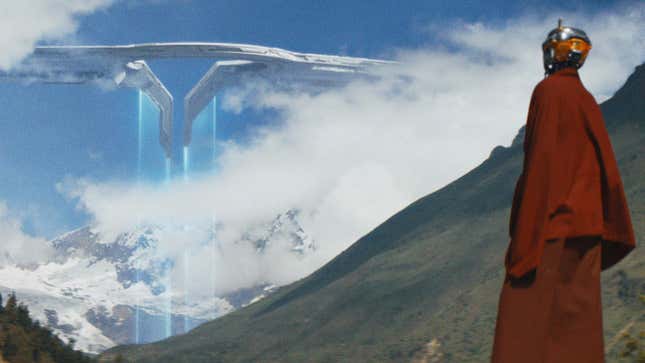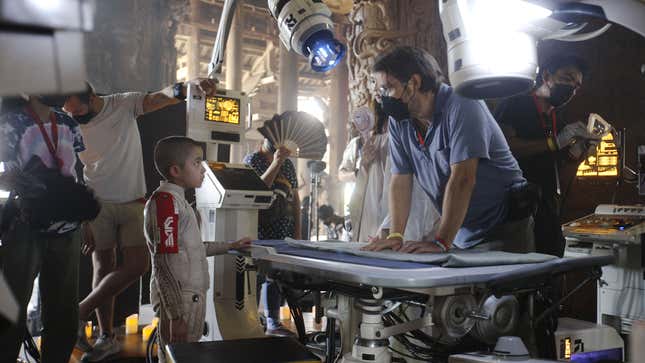
The response from critics who’ve gotten a chance to see The Creator at preview screenings has been overwhelmingly positive (on social media at least, full reviews are still embargoed). The film will probably need that good word of mouth when it opens in theaters on September 29, because the rest of the marketing campaign for the sci-fi epic has been rather lackluster.
It’s not like New Regency, or its parent company 20th Century Studios, itself now a division of Disney, haven’t made an effort. They previewed the film for exhibitors at CinemaCon in April, introduced it to fans at San Diego Comic-Con in July, and there was that creepy stunt at a Los Angeles Chargers football game. And while it’s true that the ongoing SAG-AFTRA strike has prevented the cast from promoting the film, there have been plenty of trailers, ads, and billboards. But none of that has really managed to get casual moviegoers hyped for The Creator in the way they might be for a big franchise release.
Directed by Gareth Edwards, who co-wrote the script with Chris Weitz, The Creator takes place in a future world where the American government has declared war on AI. When a former special-forces operative (John David Washington) learns that his late wife (Gemma Chan) may be alive and well in enemy territory, he signs up for a military mission to infiltrate a research base and destroy a weapon that could end the war for good. The weapon, it turns out, is an extraordinary AI in the form of a little girl (Madeleine Yuna Voyles). It’s not a complicated premise; the beauty of the film is in its depth and execution, something much harder to convey in a two-minute trailer or 60-second TV spot.
Those who don’t follow Hollywood closely may find the effusive praise surprising. The Creator is the kind of film that typically does well in the summer, so its late-September release date could signal a lack of confidence in its ability to draw blockbuster crowds (it was originally scheduled for early October, but was moved up). Now, the two biggest films opening in theaters the same weekend are Saw X and PAW Patrol: The Mighty Movie. It might end up doing well against that kind of competition, but the bar didn’t have to be set so low. Unlike those films, The Creator isn’t part of any franchise or based on any existing IP. Although it borrows liberally from iconic sci-fi films like The Terminator, Blade Runner, and The Matrix, it combines them in a way that feels modern and fresh. You wouldn’t know it, though, based on the early trailers that make it look like a generic retread of worn-out futuristic and dystopian tropes.
Those ideas were all new at one time, too. No one could have predicted what a cultural behemoth Star Wars would become when it premiered in 1977. 20th Century Fox took a chance on a young George Lucas, but those were different times, and executives were more willing to take financial and creative risks. Now it’s a struggle to get an original, high-concept sci-fi film greenlit or distributed by any of the major studios. Which makes The Creator a rarity, and also a tougher sell. Maybe that’s why the marketing has been focused on the aspects of the film that feel familiar, rather than what makes it unique.

It doesn’t help that filmmaker Gareth Edwards is hardly a household name. The Creator will be his fourth directing credit, although two of those films have pretty famous names: Rogue One: A Star Wars Story and Godzilla. The Creator has less in common with those than it does with his debut effort, the cult indie sci-fi thriller Monsters. Edwards used the guerilla techniques he perfected on that production to keep the budget to $80 million, slightly more than average, but quite modest for an effects-driven, sci-fi-action epic. Edwards shot the film on location in Asia using a consumer-grade Sony camera he operated himself, a small crew, and mostly natural lighting. That it looks as spectacular as it does is a testament to Edwards’ ingenuity and the gifted eye of cinematographer Oren Soffer. There are plenty of $300 million films out there that don’t look nearly as good. And though it may be an impressive achievement, it’s not likely a huge selling point for most potential ticket buyers.
The tricky subject matter might also contribute to the studio being a little hesitant to give the film a major push right now. To be clear, The Creator deals with AI in the classic sci-fi sense—as in, sentient humanoid robots—not “AI” in the way it’s been used of late as a catch-all term for language learning models and generative art. That’s an important distinction, since the film kind of depends on the audience empathizing with its simulant characters. Edwards couldn’t have known when he was developing the film in 2019 that “AI” would become a sticking point in labor relations between unions and the AMPTP, or the subject of multiple lawsuits.
Without any inside knowledge, we can only speculate as to why 20th Century is setting expectations so low for a film that’s been called not just the best sci-fi movie of the year, but the best movie of the year, period. Maybe that’s better than over-hyping it and then labeling it a disappointment when it doesn’t perform as well as a Marvel or Transformers film. The Creator is currently projected to make somewhere between $15 million and $24 million in its opening weekend, with a final domestic total in the range of $40 to $85 million. We don’t know how accurate that is, but we do know that if it doesn’t at least make back its production budget, it may be a while before any studio considers taking a chance on a film like this again.